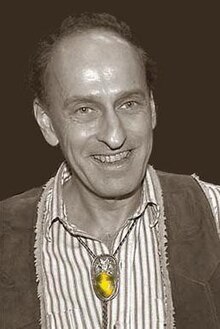Roger Zelazny
| Roger Zelazny | |
|---|---|

Roger Zelazny in Paris, 1988
|
|
| Born | Roger Joseph Zelazny May 13, 1937 Euclid, Ohio, United States |
| Died | June 14, 1995 (aged 58) Santa Fe, New Mexico, United States |
| Pen name | Harrison Denmark |
| Occupation | Writer |
| Nationality | American |
| Alma mater |
Western Reserve University (B.A.) Columbia University (M.A.) |
| Genre | Fantasy, science-fiction |
| Literary movement | New Wave (although he denounced the term himself) |
| Notable works | Lord of Light, The Chronicles of Amber, Isle of the Dead, The Doors of His Face, The Lamps of His Mouth, and Other Stories, Doorways in the Sand, Eye of Cat, Unicorn Variations, A Night in the Lonesome October |
Roger Joseph Zelazny (May 13, 1937 – June 14, 1995) was an American poet and writer of fantasy and science fiction short stories and novels, best known for The Chronicles of Amber. He won the Nebula award three times (out of 14 nominations) and the Hugo award six times (also out of 14 nominations), including two Hugos for novels: the serialized novel ...And Call Me Conrad (1965), subsequently published under the title This Immortal (1966) and then the novel Lord of Light (1967).
The ostracod Sclerocypris zelaznyi was named after him.
Roger Joseph Zelazny was born in Euclid, Ohio, the only child of Polish immigrant Joseph Frank Żelazny and Irish-American Josephine Flora Sweet. In high school, he became the editor of the school newspaper and joined the Creative Writing Club. In the fall of 1955, he began attending Western Reserve University and graduated with a B.A. in English in 1959. He was accepted to Columbia University in New York and specialized in Elizabethan and Jacobean drama, graduating with an M.A. in 1962. His M.A. thesis was entitled Two traditions and Cyril Tourneur: an examination of morality and humor comedy conventions in The Revenger's Tragedy. Between 1962 and 1969 he worked for the U.S. Social Security Administration in Cleveland, Ohio and then in Baltimore, Maryland spending his evenings writing science fiction. He deliberately progressed from short-shorts to novelettes to novellas and finally to novel-length works by 1965. On May 1, 1969, he quit to become a full-time writer, and thereafter concentrated on writing novels in order to maintain his income. During this period, he was an active and vocal member of the Baltimore Science Fiction Society, whose members included writers Jack Chalker and Joe and Jack Haldeman among others.
...
Wikipedia
